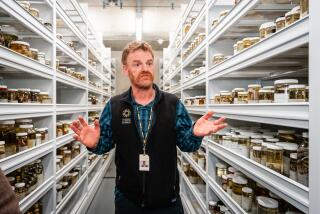Shot of Hope for People Allergic to Peanuts
- Share via
WASHINGTON — Four times in her 13 years, Aly Rush has been raced to the emergency room with a life-threatening reaction to a staple of Americana: peanuts.
In preschool once, a classmate’s peanut butter-smeared hands set off an emergency, even though Aly was sitting at another table. Once, she broke out in hives simply by breathing air in an airplane in which peanuts were served.
Even a bite tainted with peanuts or peanut oil is so dangerous that the teenager scrutinizes ingredients on food packages and grills restaurant waiters before eating.
Now she is in a groundbreaking experiment: Getting once-a-month shots that might offer the first hope of minimizing the daily threat of this allergy for thousands of Americans.
It will take several years of study to know if the experimental shots work--and if they do, this so-called anti-IgE treatment won’t be a cure. But scientists hope the drug could control a molecule that causes sufferers’ severe reactions, so that patients who accidentally eat peanuts might itch or swell up but won’t fear dying.
“Patients are very desperate because there aren’t any real treatments,” says Dr. Donald Leung, pediatric allergy chief at the National Jewish Medical and Research Center. And avoiding peanuts in manufactured foods is becoming harder, he said.
The Denver hospital is one of seven studying the experimental therapy, an antibody code-named Hu-901 and made by Houston-based Tanox Inc.
A little more than half a percent of the U.S. population is allergic to peanuts, suffering what scientists consider the most dangerous food allergy. While mildly allergic people may only suffer hives, the highly allergic rapidly go into anaphylactic shock and must always carry shots of epinephrine, commonly called Epi-pens, to treat that life-threatening condition. Several dozen sufferers are estimated to die each year.
Nobody is sure why peanuts, a legume more related to soy than tree nuts, are so allergenic. But peanuts contain more complex proteins, a cause of food allergies, than many other foods.
Experts suspect the allergy is on the rise. Partly that’s because children today eat peanut products at earlier ages, and early exposure increases the risk that someone who is genetically susceptible to the allergy will actually develop it, says Dr. Wesley Burks of Arkansas Children’s Hospital. He recommends not letting most children have any peanut-containing foods for the first year of life--and not until age 3 if allergies run in their family.
Half of all allergy sufferers accidentally eat peanuts at least once every two years. Why? Even foods not supposed to contain peanuts really can, such as when manufacturers use the same machine to mix up, say, peanut butter ice cream that they later use to mix plain chocolate. Indeed, peanuts are the No. 2 reason for allergen-related food recalls.
Lessening that risk is the hope behind the new experiment.
IgE, or immunoglobulin-E, plays a major role in asthma and numerous allergies, stimulating immune cells to overreact when exposed to certain allergens. Experimental antibodies can sop up IgE, leaving less to trigger a reaction. In large studies, an experimental asthma shot called Xolair is proving fairly effective at countering asthma-triggering IgE.
Scientists suspect sopping up peanut-sensitive IgE might work even better--because there’s more than one asthma trigger, but IgE is the sole culprit in peanut allergies. So they’re studying 84 highly allergic people, ages 12 to 60, to compare Tanox’s once-a-month anti-IgE shots to dummy shots. Participants are fed peanuts in the hospital, resuscitation equipment on hand, to measure how much it takes to cause a reaction. Then they get the shots, and later have their peanut reaction measured again.
A few patients tested so far have “had a significant improvement in their symptoms, so we’re very optimistic,” Leung said.
Deliberately eating peanuts, even in a carefully controlled study, is frightening. Children specifically are told they can drop out and “no one will be angry,” says Bonnie Rush, Aly’s mother.
But the Denver girl stuck with it because “we know it’s not a matter of if, it’s a matter of when” she’ll have another allergic reaction, Bonnie Rush explains. “If her reaction will be less than fatal, obviously this will have been more than worth it.”
Study sites include the Denver and Arkansas hospitals and Boston’s Children’s Hospital, Mayo Clinic, New York’s Mount Sinai Medical Center, Scripps Clinic and Research Foundation in La Jolla and Southern California Research in Mission Viejo. For more information, call (877) 316-7865.
More to Read
Sign up for Essential California
The most important California stories and recommendations in your inbox every morning.
You may occasionally receive promotional content from the Los Angeles Times.









